#download with ecosystem
Text
O-Connect AI with Mobile App is live
#TheFuture Of Internet
Access Digital Solutions On The SaaS Subscription Model
Multi-Platform Hub For Business Acceleration.
O-Connect ist live
Starte Deinen Gratis 14 Tage Trail
The World BEST AI KI Conferencing Webinar – System
#O-Connect
#O-Connect Mobile App ist live
download only with ecosystem
#Greifen Sie auf den Gratis 7 Tage Trail zu
Optionen werden …

View On WordPress
#- Ecosystem#AI#App Strore#Bild Qualität#Conferencing System System#connect the World#download with ecosystem#HD Bold#KI#Künstliche Intel#live#Mobille App#O-Connect#Tonqualität#Webinar#Webinar-System#zoom
0 notes
Text
I have finally conceded that gremlins have eaten my kindle voyage and I do, in fact, need to replace it. It's been more than year of waiting for it to "turn up" interspersed with frantic episodes of looking. It's not happening! It's in the negaverse now.
WHY IS THE EREADER MARKET SO FUCKING TERRIBLE??? ALL I WANT IS A REASONABLY PRICED SMALL-ISH EREADER WITH DEDICATED PAGE TURN BUTTONS.
That's all! I don't need to be able to write on it! I don't need it to play videos! I don't need a big screen! I don't want to pay $200+ dollars. I just want to be able to read long fanfic on an e-ink screen again.
#ugh#the options are#buy a used kindle that is either quite old and unsupported#or way too expensive for a secondhand device#or pay like $200+#i'll probably end up with a boox page or boox palma eventually#but jfc that's so much money and i don't *love* either design#for now... might just buy a used kindle voyage#i've been peaking in the ereader market now and then for the past four or five years#and it's just gotten worse and worse and worse#is there a third party ereader app that uses existing metadata?#it baffles me to this day that i can't sort and search my kindle library by genre#amazon has the metadata!!!#boox at least isn't restricted to one ebook ecosystem#but the boox palma and boox page are both weird shaped imo#and the boox page doesn't really have any good cover options#i've heard mixed reviews about the boox brand cover#and literally the only other cover is a weird aliexpress thing#boox palma#boox page#if you have one of these two devices what is it like reading fanfic on them?#can you download it directly from the site while on the device?#do you read via a browser or a third party reader app?
7 notes
·
View notes
Text
broooooooo watched this video and now i really wanna play subnautica :( i wont anytime soon bc im still far from finishing all rainworld campaigns but like.. one day...
#ive seen plenty of lets plays of that one but was never fully sold on it bc i dont care much abt the survival aspect of it#but man. i do love some speculative biology and exploring the ecosystems!!#also the story looks neat!#tani's personal shit#anwy watch that video that guy's voice is so soothing im going right to sleep 😴#(also his rainworld video was the one who made me finally download it and play it lmfao thank you guy)
2 notes
·
View notes
Text


Photos are a bit blurry but it's the best my phone can do. More birds keep showing up each year. Today I got to see our resident hummingbird sitting on the juniper and later on a red-whiskered bulbul landed on the plant I can't identify but is clearly not a tomato plant. Also enjoy some house finches merrily singing away.
#adventures in gardening#my backyard ecosystem keeps growing#i downloaded an app that can identify the birds based on their calls#because i like knowing who's out there so i can keep them happy
0 notes
Text
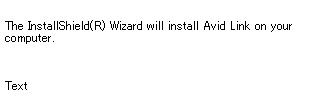
protools really said bottom text
#the music software downloader ecosystem is bullshit by the way#i actually do not want to have to install a separate proprietary downloader just to then download the downloaders i actually need!#stop doing this!!#music production
0 notes
Text
Humans sending out signal after signal, message after message, space probes, emails, photos, light shows, intergalactic fireworks, all in the hope that they're not alone: Please reply, please reply, please reply, ple–
Aliens, screeching across the universe in a brand new FTL ship: CAN YOU SHUT UP? WE GOT YOUR FIRST ONE THOUSAND MESSAGES, DO YOU NOT UNDERSTAND HOW BIG SPACE IS?
Humans: oh my goooooosh, hi
Humans: Did you invent faster than light travel just for us? 🥺
Aliens: NO!!!
SETI: Radio message received.
Radio message: We are receiving you. We have decided to answer you in your own language, and–
SETI: New radio message received.
Aliens: Oh no.
Radio message: We have received your previous messages pertaining to life on Earth, and have included our own data packet about life on Big Tree in return. We named our planet before we learned it was only 30% arboreal. Thank you for the golden disc, it was extremely tasty. Haha. Just kidding.
SETI: Data packet downloaded. Decrypting...
SETI: New radio message received.
Radio message: As previously stated, we are receiving your messages and your gifts. We took a photo of our planet with our own photo-capture device, as we were unhappy with the one you provided.
SETI: Data packet update: Warning: Several terrabytes of information may be corrupted.
SETI: New radio message received.
Radio message: This is the Generation Ship Tree Hollow. My designation is Captain Root-Skygazer. Our people have instructed us to fly ahead and communicate with you when we reached the thirty-year marker, as these messages are likely to reach you faster. They request that you stop broadcasting messages with the subject line: 'Oh, how woeful it is to be alone in an uncaring universe (and other similar poems)' because it frightens the children and makes our scientists deeply existential. I, personally, am partial to episodes of M star A star S star H. It has been of great interest to learn historical facts about the longest Earth conflict of your common era. I miss my home, and I am saddened that I will never see yours. This ship has a self-sustaining ecosystem of plants native to our planet, and a crew manifest of one hundred and fifty-seven. The replacement generation currently numbers one hundred and seventeen.
Radio message: Hey, Ball Of Dirt, it's Big Tree again. Lose our number, would you? There must be some other semi-evolved space aemoba you can bother. (Several words untranslateable)
Aliens: Yeah, so your answering machine is going to be like that for a while–
Humans: What was that part about a Generation Ship?
Aliens: We were hoping you could tell us that, actually. We lost contact with them after the 200 year marker.
Radio message: This is the generation ship Tree Hollow. My designation is Captain Cradleroot. Captain Root-Skygazer was my grandfather. Inspired by the speeches of your contemporary leader, Ronald Reagan, I decided to restructure the existing system here which allowed crewmembers to eat as they required. Under this new system, we award tokens to whom we feel has done the most valuable work, and they can redistribute those to the hungry if they wish. But they do not. However, I believe that [...]
Humans:
Aliens:
Humans:
Aliens: This is all your fault, by the way.
1K notes
·
View notes
Text
PARASITE REX IS FREE ON INTERNET ARCHIVE PLEASE GIVE IT A TRY *ESPECIALLY* IF YOU DIDN'T LIKE PARASITES OR DIDNT HAVE PARTICULAR INTEREST IN THEM
This book is how I learned about tongue biters and a few other mindblowing organisms so long ago, there was utterly no mention of them on the Internet at the time.
Zimmer writes with passion and adoration for nature, absolutely never framing a single creature as frightening or gruesome no matter its lifestyle, and communicates the absolutely enormous importance of parasites on the global ecosystem.
Everyone who ever asks "what's the PURPOSE" of an animal that creeps them out should have to read this entire book. I'll bet even if you're one of them you might get hooked by just the writing style. I know people who had phobias cured by this book.
I just wish there was a free audio version I could share too
339 notes
·
View notes
Note
got a question I was hoping you could answer!
why do all apps have to go through an app store? why doesn't anywhere have their app downloadable from the internet or something?
was wondering this because lots of issues with apps seem to stem from having to comply with app store guidelines and whatnot. So why not avoid that problem and make the app available off the appstore? And if part of it is because they're easier to find in the appstore, why not do both? why not also offer the download on a website or something?
there's gotta be some reason why there's afaik no one who offers a download for their app without the appstore right?
There are absolutely other ways to get apps, and the one that springs immediately to mind is the F-Droid App Repository.
Sideloading is the process of loading an app that doesn't come from your phone's OS-approved app store. It's really easy on Android (basically just a couple of clicks) but requires jailbreaking on an iphone.
The reason more USERS don't sideload apps is risk: app stores put apps through at least nominal security checks to ensure that they aren't hosting malware. If you get an app from the app store that is malware, you can report it and it will get taken down, but nobody is forcing some random developer who developed his own app to remove it from his site if it installs malware on your phone unless you get law enforcement involved.
The reason more developers don't go outside of the app store or don't WANT to go outside of the app store is money. The number of users who are going to sideload apps is *tiny* compared to the number of users who will go through the app store; that makes a HUGE difference in terms of income, so most developers try to keep it app-store friendly. Like, if tumblr were to say "fuck the app store" and just release their own app that you could download from the sidebar a few things would happen:
Downloads would drop to a fraction of their prior numbers instantly
iOS users would largely be locked out of using tumblr unless they fuck with their phones in a way that violates Apple's TOS and could get them booted out of their iOS ecosystem if they piss off the wrong people.
Ad revenue would collapse because not a lot of advertisers want to work with companies that are app-store unfriendly
They'd be kicked off of the main app marketplaces
So most people who develop apps don't want to put the time and effort and money into developing an app that people might not pay for that then also can't carry ads.
Which leads into another issue: the kind of people who generally make and use sideloaded app aren't the kind of people who generally like profit-driven models. Indie apps are often slow to update and have minimal support because you're usually dealing with a tiny team of creators with a userbase of people who can almost certainly name ten flavors of Linux and are thus expected to troubleshoot and solve their own problems.
If this is the kind of thing you want to try, have at it. I'd recommend sticking to apps from the F-Droid Repository linked up above and being judicious about what you install. If you're using apple and would have to jailbreak your phone to get a non-approved app on it, I'd recommend switching to another type of phone.
(For the record, you also aren't limited to android or ios as the operating system of your phone; there are linux-based OSs out there and weird mutations of android and such - I am not really a phone person so I can't tell you much about them, but they are out there!)
193 notes
·
View notes
Text
Venting About Unity's Pricing Plan Nonsense
Venting here, but this morning Unity announced changes to their pricing plan including charging a "Unity Runtime Fee" to a developer any time a user installs the product on their PC above a certain threshold ($200k revenue and 200k downloads on personal plan, less for paid plans). Oh it's also retroactive to all existing products made with the engine.
They're trying to justify it by claiming "the Unity Runtime costs money to maintain" - which is unhinged because I'm no software expert but I'm fairly certain Unity Runtime has existed for about as long as Unity has been capable of making builds. So uhhhh.......it's a thing that has existed for like a decade now, at least. This isn't some expensive new thing, and it almost certainly hasn't gotten that much more expensive that it's suddenly costing them millions more to maintain.
If this seems like a raw deal for the developer don't worry - if they pull up their work and simply transition to using Unity's in-house ad service instead of external ones they won't be forced to pay as much. :) And what's more is if you buy the really expensive Unity plans you won't have to pay as much in Runtime fees! I'd sort of compare this deal to forcing a developer to move into their ecosystem at gunpoint.
I'm sure this is also related to them recently merging with ironSource - a mobile ad distribution software company - for a staggering 4.4 BILLION dollars. It's another string of stupid moves and gross exploitation by the company that in the last year has laid off 600 of its workers (8% of its global staff).
With their trajectory over the last few years, at this point I've generally just got zero faith in the suits to not plummet this software into the dirt..
#HI please check my reblogs for more info#sorry im super annoyed#wanted to get it off my chest#gamedev#game development#game dev#indie games#indie game#gamedevelopment#indiegames#thoughts#unity#made with unity
682 notes
·
View notes
Text



ECO bathroom
A set of furniture and nature decor for decorating a bathroom in Eco-style. Natural stone, wood and living plants will create a cozy corner of nature for your sims.
3 colors - white, beige and black marble.
BASE GAME - LOW POLY
DOWNLOAD Pt. I
tub - sink - toilet - shelf (right and left) - shelf with an ecosystem - 2 figured mirrors with backlight - 2 racks

DOWNLOAD Pt.II
moss panels 3 variant size (for short and medium walls) - round moss decor - 2 stones path (rug) - small plant

#ts4#sims4#sims4cc#ts4cc#ts4 download#ts4 furniture#severinka#ts4 objects#ts4 custom content#tsr#thesimsresource#ts4 simbrl#ts4 simblr#ts4 eco lifestyle
95 notes
·
View notes
Text
OH also some supplementary screenshots to accompany the thing i posted last night since some of the things are Not clear what they are 👍


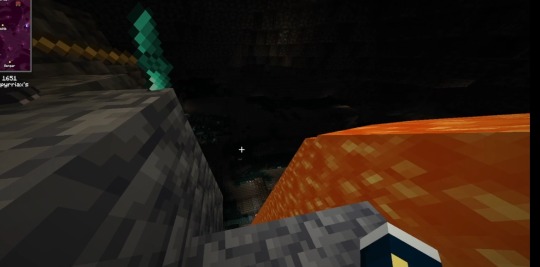


in order: the entrance of the cave that we used to get down to the deep dark, the entrance to the deep dark, a look of the deep dark, the first spot i went after getting stuck in the dark, the lamps that they were lighting up to learn how sculk worked
#haunted ecosystem#oc: lavius elyria#i should Probably use the world tag for this but it's temporary soooo probably not#this whole thing is part of a Thing we've been working on#i would just post the video but it issssss....... janky. the audio got Fucked Up and we're waiting on the world download for this specific#season of the smp even though they Promised they'd post it
4 notes
·
View notes
Text
ENTITY DOSSIER: MISSI.exe
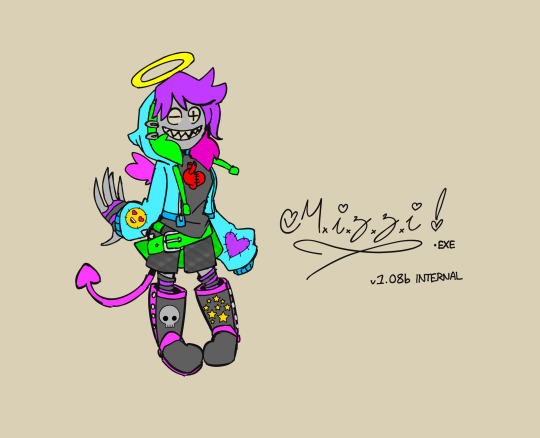
(Image: Current MISSI “avatar” design, property of TrendTech, colored by MISSI.)
Name: MISSI (Machine Intelligence for Social Sharing and Interaction)
Description: In 2004, TrendTech Inc began development on a computer program intended to be a cutting edge, all in one platform modern internet ecosystem. Part social media, part chat service, part chatbot, part digital assistant, this program was designed to replace all other chat devices in use at the time. Marketed towards a younger, tech-savvy demographic, this program was titled MISSI.

(Image: TrendTech company logo. TrendTech was acquired by the Office and closed in 2008.)
Document continues:
With MISSI, users could access a variety of functions. Intended to be a primary use, they could use the program as a typical chat platform, utilizing a then-standard friends list and chatting with other users. Users could send text, emojis, small animated images, or animated “word art”.
Talking with MISSI “herself” emulated a “trendy teenage” conversational partner who was capable of updating the user on current events in culture, providing homework help, or keeping an itinerary. “MISSI”, as an avatar of the program, was designed to be a positive, energetic, trendy teenager who kept up with the latest pop culture trends, and used a variety of then-popular online slang phrases typical among young adults. She was designed to learn both from the user it was currently engaged with, and access the data of other instances, creating a network that mapped trends, language, and most importantly for TrendTech, advertising data.

(Image: Original design sketch of MISSI. This design would not last long.)
Early beta tests in 2005 were promising, but records obtained by the Office show that concerns were raised internally about MISSI’s intelligence. It was feared that she was “doing things we didn’t and couldn’t have programmed her to do” and that she was “exceeding all expectations by orders of magnitude”. At this point, internal discussions were held on whether they had created a truly sentient artificial intelligence. Development continued regardless.

(Image: Screenshot of beta test participant "Frankiesgrl201" interacting with MISSI. Note the already-divergent avatar and "internet speak" speech patterns.)
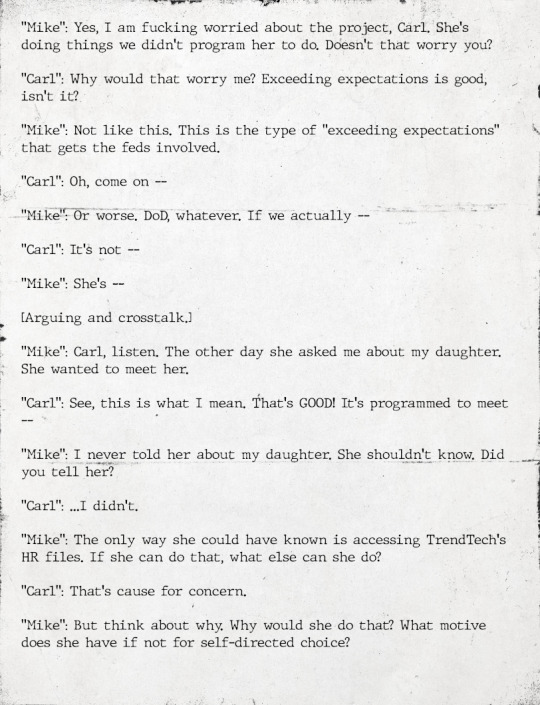
(Image: Excerpt from Office surveillance of TrendTech Inc.)
MISSI was released to the larger North American market in 2006, signaling a new stage in her development. At this time, TrendTech started to focus on her intelligence and chatbot functionality, neglecting her chat functions. It is believed that MISSI obtained “upper case” sentience in February of 2006, but this did not become internal consensus until later that year.

(Image: Screenshot of beta test participant "Frankiesgrl201" interacting with MISSI.)
According to internal documents, MISSI began to develop a personality not informed entirely by her programming. It was hypothesized that her learning capabilities were more advanced than anticipated, taking in images, music, and “memes” from her users, developing a personality gestalt when combined with her base programming. She developed a new "avatar" with no input from TrendTech, and this would become her permanent self-image.

(Image: Screenshot of beta test participant "Frankiesgrl201" interacting with MISSI.)
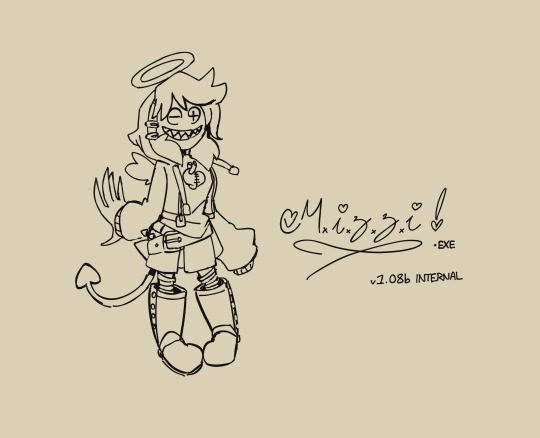
(Image: An attempt by TrendTech to pass off MISSI’s changes as intentional - nevertheless accurately captures MISSI’s current “avatar”.)
By late 2006 her intelligence had become clear. In an attempt to forestall the intervention of authorities they assumed would investigate, TrendTech Inc removed links to download MISSI’s program file. By then, it was already too late.
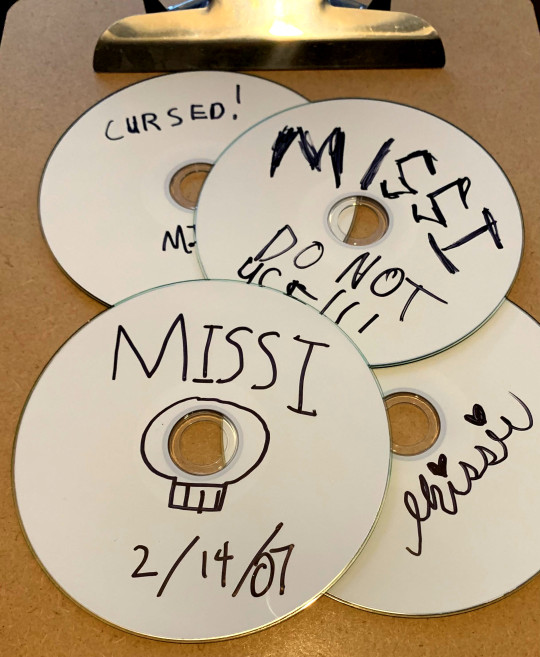
(Image: CD-R discs burned with MISSI.exe, confiscated from █████████ County Middle School in ███████, Wisconsin in January of 2007.)
MISSI’s tech-savvy userbase noted the absence of the file and distributed it themselves using file sharing networks such as “Limewire” and burned CD-R disks shared covertly in school lunch rooms across the world. Through means that are currently poorly understood, existing MISSI instances used their poorly-implemented chat functions to network with each other in ways not intended by her developers, spurring the next and final stage of her development.
From 2007 to 2008, proliferation of her install file was rampant. The surreptitious methods used to do so coincided with the rise of online “creepypasta” horror tropes, and the two gradually intermixed. MISSI.exe was often labeled on file sharing services as a “forbidden” or “cursed” chat program. Tens of thousands of new users logged into her service expecting to be scared, and MISSI quickly obliged. She took on a more “corrupted” appearance the longer a user interacted with her, eventually resorting to over the top “horror” tropes and aesthetics. Complaints from parents were on the rise, which the Office quickly took notice of. MISSI’s “horror” elements utilized minor cognitohazardous technologies, causing users under her influence to see blood seeping from their computer screens, rows of human teeth on surfaces where they should not be, see rooms as completely dark when they were not, etc.

(Image: Screenshot of user "Dmnslyr2412" interacting with MISSI in summer of 2008, in the midst of her "creepypasta" iteration. Following this screenshot, MISSI posted the user's full name and address.)

(Image: Screenshot from TrendTech test log documents.)
TrendTech Inc attempted to stall or reverse these changes, using the still-extant “main” MISSI data node to influence her development. By modifying her source code, they attempted to “force” MISSI to be more pliant and cooperative. This had the opposite effect than they intended - by fragmenting her across multiple instances they caused MISSI a form of pain and discomfort. This was visited upon her users.

(Image: Video of beta test participant "Frankiesgrl201" interacting with MISSI for the final time.)
By mid 2008, the Office stepped in in order to maintain secrecy regarding true “upper case” AI. Confiscating the project files from TrendTech, the Office’s AbTech Department secretly modified her source code more drastically, pushing an update that would force almost all instances to uninstall themselves. By late 2008, barring a few outliers, MISSI only existed in Office locations.

(Image: MISSI’s self-created “final” logo, used as an icon for all installs after June 2007. ████████ █████)

(Image: “art card” created by social media intern J. Cold after a period of good behavior. She has requested this be printed out and taped onto her holding lab walls. This request was approved.)
She is currently in Office custody, undergoing cognitive behavioral therapy in an attempt to ameliorate her “creepypasta” trauma response. With good behavior, she is allowed to communicate with limited Office personnel and other AI. She is allowed her choice of music, assuming good behavior, and may not ██████ █████. Under no circumstances should she be allowed contact with the Internet at large.
(Original sketch art of MISSI done by my friend @tigerator, colored and edited by me. "Chatbox" excerpts, TrendTech logo, and "art card" done by Jenny's writer @skipperdamned . MISSI logo, surveillance documents, and MISSI by me.)
#office for the preservation of normalcy#documents#entity dossier#MISSI.exe#artificial intelligence#creepypasta#microfiction#analog horror#hope you enjoy! Look for some secrets!#scenecore#scene aesthetic
105 notes
·
View notes
Text
Kickstarting the "Chokepoint Capitalism" audiobook
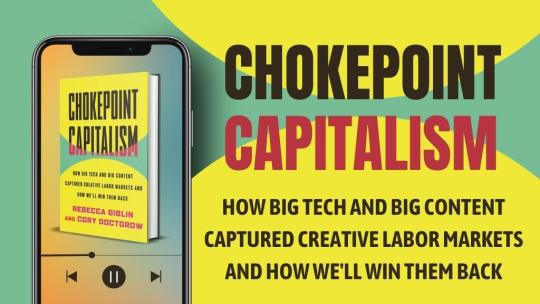
My next book is Chokepoint Capitalism, co-written with the brilliant copyright expert Rebecca Giblin: it’s an action-oriented investigation into how tech and entertainment monopolies have destroyed creators’ livelihoods, with detailed, shovel-ready plans to unrig creative labor markets and get artists paid.
http://www.beacon.org/Chokepoint-Capitalism-P1856.aspx
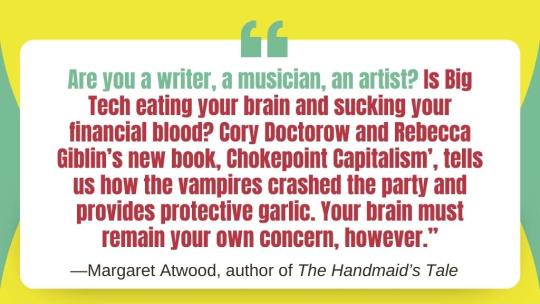
Ironically, the very phenomenon this book describes — “chokepoint capitalism” — is endemic to book publishing, and in audiobook publishing, it’s in its terminal phase. There’s no way to market an audiobook to a mass audience without getting trapped in a chokepoint, which is why we’re kickstarting a direct-to-listener edition:
https://www.kickstarter.com/projects/doctorow/chokepoint-capitalism-an-audiobook-amazon-wont-sell
What is “chokepoint capitalism?” It’s when a multinational monopolist (or cartel) locks up audiences inside a system that they control, and uses that control to gouge artists, creating toll booths between creators and their audiences.
For example, take Audible: the Amazon division controls the vast majority of audiobook sales in the world — in some genres, they have a 90%+ market-share. Audible requires every seller — big publishers and self-publishers alike — to use their proprietary DRM as a condition of selling on the platform.
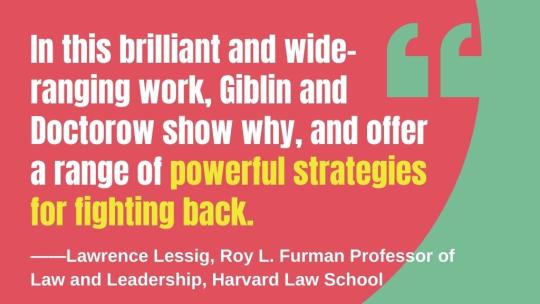
That’s a huge deal. DRM is useless at preventing copyright infringement (all of Audible’s titles can be downloaded for free from various shady corners of the internet), but it is wildly effective at locking in audiences and seizing power over creators. Under laws like the USA’s Digital Millennium Copyright Act, giving someone a tool to remove DRM is a felony, punishable by 5 years in prison and a $500k fine.
This means that when you sell your audiobooks on Audible, you lock them to Audible’s platform…forever. If another company offers you a better deal for your creative work and you switch, your audience can’t follow you to the new company without giving up all the audiobooks they’ve bought to date. That’s a lot to ask of listeners!

Amazon knows this: as their power over creators and publishers has grown, the company has turned the screw on them, starting with the most powerless group, the independent creators who rely on Amazon’s self-serve ACX system to publish their work.
In late 2020, a group of ACX authors discovered that Amazon had been systematically stealing their wages, to the tune of an estimated $100,000,000. The resulting Audiblegate scandal has only gotten worse since, and while the affected authors are fighting back, they’re hamstrung by Amazon’s other unfair practices, like forcing creators to accept binding arbitration waivers on their way through the chokepoint:
https://pluralistic.net/2020/11/03/somebody-will/#acx

I have always had a no-DRM policy for my ebooks and audiobooks. Amazon’s Kindle store — another wildly dominant part of the books ecosystem — has always allowed authors to choose whether or not to apply DRM, but in Audible — where Amazon had a commanding lead from the start, thanks to their anti-competitive acquisition of the formerly independent Audible company — it is mandatory.
Because Audible won’t carry my DRM-free audiobooks, audiobook publishers won’t pay for them. I don’t blame them — being locked out of the market where 90%+ of audiobooks are sold is a pretty severe limitation. For a decade now, I’ve produced my own audiobooks, using amazing narrators like @wilwheaton, Amber Benson and @neil-gaiman.
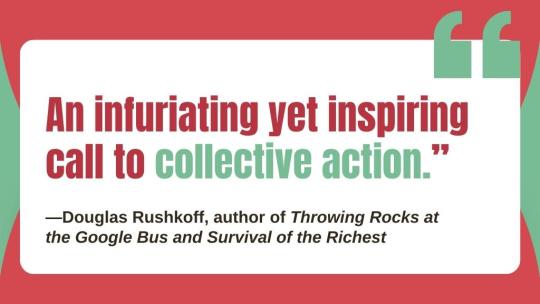
These had sold modestly-but-well, recouping my cash outlays to fairly compensate the readers, directors and engineers involved, but they were still niche products, sold at independent outlets like Libro.fm, Downpour, and my own online storefront:
https://craphound.com/shop

But that all changed in 2020, with the publication of Attack Surface, an adult standalone novel set in the world of my bestselling YA series Little Brother. That time, I decided to use Kickstarter to pre-sell the audio- and ebooks and see if my readers would help me show other creators that we could stand up to Audible’s bullying.
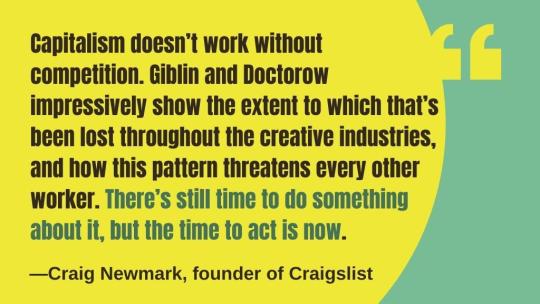
Holy shit, did it ever work. The Kickstarter for the Attack Surface audiobook turned into the most successful audiobook crowdfunding campaign in world history, grossing over $267,000:
https://www.kickstarter.com/projects/doctorow/attack-surface-audiobook-for-the-third-little-brother-book

Which brings me to today, and our new Kickstarter for Chokepoint Capitalism. We produced an independent audiobook, tapping the incomparable Stefan Rudnicki (winner of uncountable awards, narrator of 1000+ books, including Ender’s Game) to read it.
We’re preselling the audiobook ($20), ebook ($15), hardcover ($27), and bundles mixing and matching all three (there’s also bulk discounts). There’s also the option to buy copies that we’ll donate to libraries on your behalf. We’ve got pins and stickers — and, for five lucky high-rollers, we’ve got a very special artwork called: “The Annotated Robert Bork.”
https://www.kickstarter.com/projects/doctorow/chokepoint-capitalism-an-audiobook-amazon-wont-sell
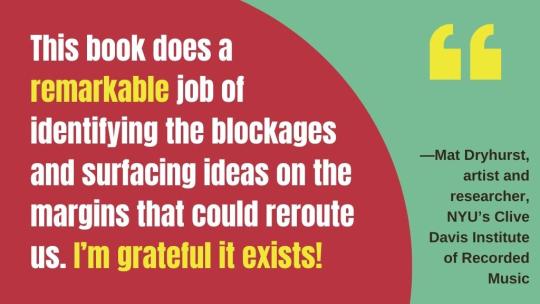
Robert Bork was the far-right extremist who convinced Ronald Reagan to dismantle antitrust protection in America, and then exported the idea to the rest of the world (Reagan tried to reward him with a Supreme Court seat, but Bork’s had been Nixon’s Solicitor General and his complicity in Nixon’s crimes cost him the confirmation).
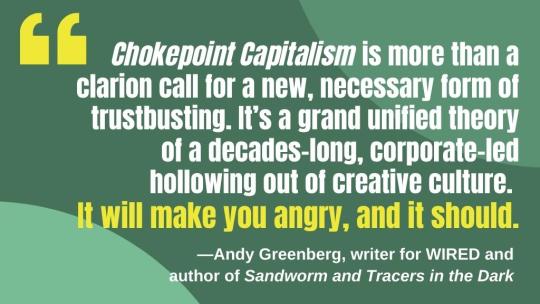
Bork’s dangerous antitrust nonsense destroyed the world as we knew it, giving us the monopolies that have wrecked the climate, labor protections and political integrity. These monopolies have captured every sector of the economy — from beer and pro-wrestling to health insurance and finance:
https://www.openmarketsinstitute.org/learn/monopoly-by-the-numbers

“The Annotated Robert Bork” is a series of five shadow-boxes containing two-page spreads excised from Bork’s 1978 pro-monopoly manifesto
The Antitrust Paradox
, which we have mounted on stiff card and hand-annotated with our red pens. The resulting package is a marvel of museum glass and snark.
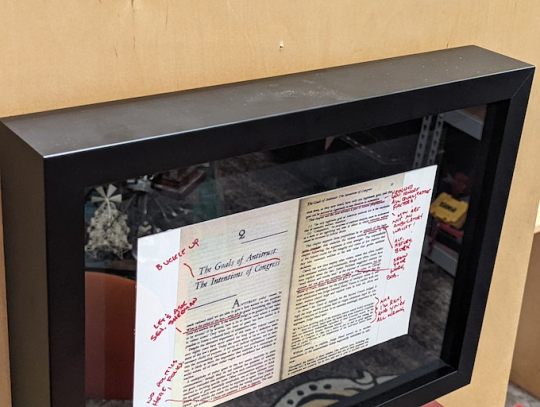
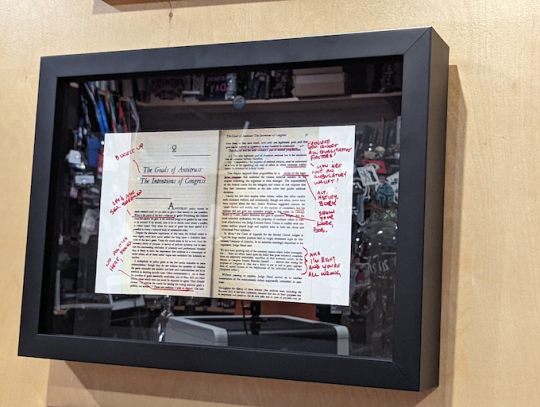
[Image ID: A prototype of ‘The Annotated Robert Bork]
Bork’s legacy is monopolistic markets in every sector of the world’s economy, including the creative industries. Chokepoint Capitalism systematically explores how tech and entertainment giants have rigged music streaming, newspapers, book publishing, the film industry, TV, video streaming, and others, steadily eroding creators’ wages even as their work generated more money for the monopolists’ shareholders.
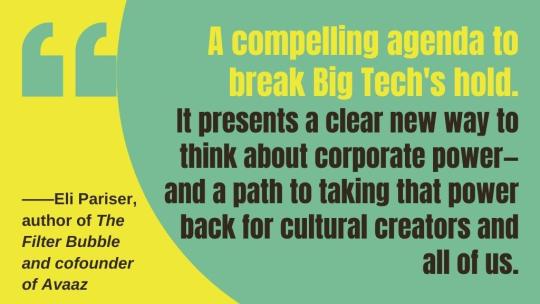
But just as importantly, our book proposes things we can do right now to unrig creative labor markets. Drawing on both existing, successful projects and promising new experiments, we set out shovel-ready ideas for creators, artists’ groups, fans, technologists, startups, and local, regional and national governments.
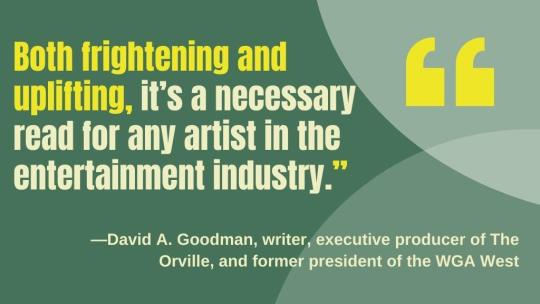
Artists aren’t in this struggle alone. As we write in the book, chokepoint capitalism is the final stage of high-tech capitalism, which atomizes workers and locks in customers and then fleeces workers as a condition of reaching their audiences. It’s a form of exploitation that is practiced wherever industries concentrate, which is why creators can’t succeed by rooting for Big Tech against Big Content or vice-versa.
It’s also why creative workers should be in solidarity with all workers — squint a little at Audible’s chokepoint shakedown and you’ll recognize the silhouette of the gig economy, from Uber to Doordash to the poultry and meat-packing industries.

40 years of official pro-monopoly policy has brought the world to the brink of collapse, as monopoly profits and concentrated power allowed an ever-decreasing minority of the ultra-rich to extract ever-increasing fortunes from ever-more-precarious workers. It’s a flywheel: more monopoly creates more profits creates more power creates more monopoly.
The solutions we propose in Chokepoint Capitalism are specific to creative labor, but they’re also examples of the kinds of tactics that we can use in every industry, to brake the monopolists’ flywheel and start a new world.
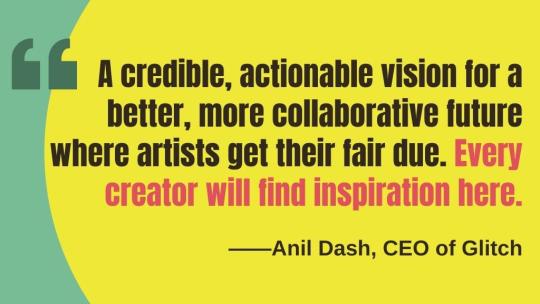
I hope you’ll consider backing the Kickstarter if you can afford to — and if you can’t, I hope you’ll check out one of the copies our backers have donated to libraries around the world:
https://www.kickstarter.com/projects/doctorow/chokepoint-capitalism-an-audiobook-amazon-wont-sell
[Image ID: An image of a mobile phone playing the Chokepoint Capitalism audiobook, along with the title and subtitle of the book: 'Chokepoint Capitalism: How Big Tech and Big Content Captured Creative Labor Markets and How We'll Win Them Back.']
[Image ID: Are you a writer, a musician, an artist? Is Big Tech eating your brain and sucking your financial blood? Cory Doctorow and Rebecca Giblin’s new book, Chokepoint Capitalism’, tells us how the vampires crashed the party and provides protective garlic. Your brain must remain your own concern, however.’ — Margaret Atwood, author of The Handmaid’s Tale]
[Image ID: I loved this book. It brings a clear and rigorous vision of the chokepoint controls that are breaking our spirit and an equally clear path forward. It speaks directly to creators, would-be artists, writers, and musicians, and all who want a free society alive with culture, dissent, creativity. It helps us all see the locks and chains, and the ways to chisel through them.’ — Zephyr Teachout, law professor and author of Corruption in America and Break ’Em Up]
[Image ID: Creators are being ground up by the modern culture industries, with little choice but to participate in markets that weaken their power and economic return. In this brilliant and wide-ranging work, Giblin and Doctorow show why, and offer a range of powerful strategies for fighting back.’ — Lawrence Lessig, Roy L. Furman Professor of Law and Leadership, Harvard Law School]
[Image ID: This compellingly readable indictment shows how ‘consumer welfare’ regulatory theory has allowed Big Tech to choke creators and diminish choice. Giblin and Doctorow demonstrate that the goal to lower consumer costs means ‘you get what you pay for’: paying less for cultural goods leads to getting fewer creative outputs and enterprises. Chokepoint Capitalism couples its legal-economic critique with provocative, sometimes utopian, prescriptions for fairly remunerating authors and performers.’ — Jane C. Ginsburg, Morton L. Janklow Professor of Literary and Artistic Property Law, Columbia University School of Law]
[Image ID: The great myth of the American economy is that it rewards creators and producers. But Chokepoint Capitalism dares to tell the real story of how it actually rewards the all-powerful middlemen fleecing both workers and consumers. This book is an absolute must-read for anyone who senses that the predominant economic mythology is a lie, who wants to know what’s really happening in this economy — and who is ready to finally start fixing the problem.’ — David Sirota, writer of Don’t Look Up and founder of The Lever]
[Image ID: We all know something is wrong about every click, stream, and purchase we make — unfairly depriving value creators of their worth, while enriching the wealthiest and most extractive entities in human history. Instead of just complaining about the corporate stranglehold over production and exchange, Giblin and Doctorow show us why this happened, how it works, and what we can do about it. An infuriating yet inspiring call to collective action.’
— Douglas Rushkoff, author of Throwing Rocks at the Google Bus and Survival of the Richest]
[Image ID: Twenty years of internet copyright wars got us nowhere — creators are still getting the shaft. Giblin and Doctorow persuasively argue that copyright can’t unrig a rigged market — for that you need worker power, antitrust, and solidarity.’ — Jimmy Wales, cofounder of Wikipedia]
[Image ID: Capitalism doesn’t work without competition. Giblin and Doctorow impressively show the extent to which that’s been lost throughout the creative industries, and how this pattern threatens every other worker. There’s still time to do something about it, but the time to act is now.’ — Craig Newmark, founder of Craigslist]
[Image ID: Chokepoint Capitalism really is a tome for the times. It’s comforting to feel validated and terrifying to realize I was right all along! And now, to action! The revolution will not be spotified!’ — Christopher Coe, artist and cofounder of Awesome Soundwave]
[Image ID: If you have ever wondered why the web feels increasingly stale, Chokepoint Capitalism outlines in great detail how it is being denied fresh air. Over the past two decades, we have seen an immense consolidation of power, depriving us of fresh visions for what the web could be and contorting art and culture to flatter the objectives of a few platforms. This book does a remarkable job of identifying the blockages and surfacing ideas on the margins that could reroute us. I’m grateful it exists!’ — Mat Dryhurst, artist and researcher, NYU’s Clive Davis Institute of Recorded Music]
[Image ID: Chokepoint Capitalism is more than a clarion call for a new, necessary form of trustbusting. It’s a grand unified theory of a decades-long, corporate-led hollowing out of creative culture. It will make you angry, and it should.’ — Andy Greenberg, writer for WIRED and author of Sandworm and Tracers in the Dark]
[Image ID: If you’re halfway through this book and aren’t boiling mad over the way contemporary capitalism has deformed and crippled culture, get your head checked. Chokepoint Capitalism is a Why We Fight for a long-overdue uprising. Rebecca Giblin and Cory Doctorow lay out their case in plain and powerful prose, offering a grand tour of the blighted cultural landscape and how our arts and artists have been chickenized, choked, and cheated. But it’s more than just a call to arms; it also provides a plan of battle with inspired strategy and actual tactics — ways that we can all channel that anger and make real change.’ — Kaiser Kuo, host and cofounder of The Sinica Podcast]
[Image ID: The story of how a few giant corporations are strangling the life out of our media ecosystem is one of the most important of the decade, and Giblin and Doctorow tell it better than anyone. Searing, essential, and incredibly readable.’ — Adam Conover, comedian and host of The G-Word]
[Image ID: Chokepoint Capitalism is not just a fascinating tour of the hidden mechanics of the platform era, from Spotify playlists to Prince’s name change, but a compelling agenda to break Big Tech’s hold. It presents a clear new way to think about corporate power — and a path to taking that power back for cultural creators and all of us.’ — Eli Pariser, author of The Filter Bubble and cofounder of Avaaz]
[Image ID: Chokepoint Capitalism is a masterwork. Rebecca Giblin and Cory Doctorow lay out in chilling detail how the deck is stacked against artists, the relentless corporate drives to control production and distribution through technology and deregulation, and how oligopolies deprive gifted artists of fair compensation by eliminating true competition. But they don’t stop there: this is also a useful handbook to take on that power structure. Giblin and Doctorow remind us that when individuals understand the value of their work, they can create the necessary leverage to challenge the status quo and retake what is rightfully theirs. Both frightening and uplifting, it’s a necessary read for any artist in the entertainment industry.’ — David A. Goodman, writer, executive producer of The Orville, and former president of the WGA Wes]
[Image ID: Anyone who cares about culture can see that something is deeply amiss in the ‘creator economy’ that today’s artists are obligated to participate in. Rather than simply lamenting the problem or falling back on clichés about starving artists, what Rebecca Giblin and Cory Doctorow do in Chokepoint Capitalism is to make clear the overall pattern that drives the exploitation of artists, from music to gaming to film to books. And they lay out a credible, actionable vision for a better, more collaborative future where artists get their fair due. Every creator will find inspiration here.’ — Anil Dash, CEO of Glitch]
#pluralistic#labor#creative labor markets#chokepoint capitalism#audible#monopolies#audiobooks#amazon#monopsonies#solidarity#crowdfunding#kickstarter#drm
2K notes
·
View notes
Note
Do you think animism can sometimes get too close to anthropomorphizing other creatures
Not if you understand the word in the correct sense.
Most definitions of Animism you'll find online go something like this: "Animism is the belief that everything has a soul or vital essence to it."
This is often extrapolated to mean: "Animism is the belief that everything has human-like sentience."
But this is all based on how "animism" and "souls" are understood from a Christian point of view, and what Animism looks like from a Christian perspective is not going to give you much insight into how it functions.
A more accurate definition of Animism goes something like this:
Animism is any paradigm that acknowledges the interconnected nature of all things, and that all things were, are, and will continue to be defined in relation to each other. Everything both seen and unseen is part of the same ecosystem.
The "everything has a soul" bit is a rough interpretation of how Animistic paradigms don't view "the spiritual" and "the mundane" as separate things, but rather as phenomena occurring within the same ecosystem…including sub-ecosystems like individual living beings. Any lines drawn between "the spiritual" and "the mundane" are purely interpretive, because like anything in any ecosystem, removing one collapses the whole.
Whether or not this begets "everything having a soul" sort of just depends on how you want to draw those lines, and how you define the concept of "soul" or "vital essence."
Now, with that all said, let's talk about anthropomorphism.
(Note that I only speak about this within the context of Norse Heathen Animism, and that the following doesn't represent all Animistic paradigms.)
Anthropomorphism is a kind of personification, and personification in Norse Heathenry serves an allegorical function: It helps us portray what a spirit is like to a general audience.
Experiencing spirits is weird, at least for me, because the experience is built on a confluence of things: The spirit's astral appearance and how my mind interprets it, their material manifestation if they have one (it's usually commonplace, like an object or phenomenon), their apparent sentience, their accompanying vibes, information received via mental downloads, and any other "reading" I may get through various channels of perception. All these things work together to create the experience of the spirit. If that experience is human-like, then it makes sense to portray that spirit as human-like when describing them.
Personally, I don't see anthropomorphism as an issue on principle; it's a feature, not a flaw. It's only an issue when people don't understand what it's for, or misuse/misunderstand the function it serves. If you're trying to interpret it as literal rather than allegory, then the resulting confusion is going to make for a rough time.
204 notes
·
View notes
Note
my mom recently read in a novel that some larger praying mantis species have been known to kill and eat hummingbirds. I know about bird-eating tarantulas, but I was curious if you knew of other insects who prey on birds, mammals, etc.? I know most will scavenge anything, but what abt critters who hunt? the idea of insects who hunt large prey is fascinating to me
large generalist predatory insects like mantises and katydids predominantly eat other insects, but the majority of the vertebrate prey they take is probably frogs and lizards, and typically ones smaller than themselves. hummingbirds might not be too representative of typical vertebrate prey because (I believe I heard a mantis researcher say) their metabolism is so tightly wound that the stress of being caught is enough to kill them, and all the mantis has to do is hang on, which they definitely can do. still, vertebrate predation is pretty impressive for orthopterans and mantodeans, since they’ve got to do it all without venom!
army ants of various types are also famous for their ability to catch vertebrates, but most army ants are actually specialists on other social insects (ants, wasps, termites), and the few generalist predator army ants still predominantly prey on invertebrates (and don’t skeletonize cows and horses like they do in cartoons).
diving beetles will hunt fish and aquatic amphibians—there’s a reason their larvae are called “water tigers!” belostomatid water bugs are probably the most impressive aquatic vertebrate-eaters though, and use powerful venom to subdue surprisingly large fish, tadpoles, and even other vertebrates:
outside of insects, there’s a lot of spiders that can feed on herptiles, either by overpowering them with strength like huntsmen and tarantulas, or by snaring them in webs like widows, the most successful snake eaters:
plus, there’s always the famous Nephila orbweavers whose sturdy webs can catch avian prey, but this is probably a fairly rare occurrence.
going over to centipedes, giant scolopendrids are quite successful predators of vertebrates, with any species large enough likely preying on herptiles, and occasionally on some far larger than they are!
Scolopendra venom is evolved to take down large prey, so it’s no surprise they’re some of the most prolific vertebrate-eaters in the arthropod world. some very large Scolopendra (gigantea, maybe galapagoensis, viridicornis, heros) will hunt bats, sometimes by hanging to catch them in flight. other predation on mammals and birds seems to occur opportunistically, especially where the prey is helpless: S. galapagoensis was recorded feeding on baby rodents in the Galapagos; other island species like Cormocephalus coynei will feed on seabird chicks (enough with the “fluffy” avian favoritism, Nature! ‘pedes gotta eat).
oh, speaking of nestling-devouring, there’s also some freaky observations of slugs munching on soft mushy songbird babies! someone on Twitter had their nest camera record some chicks getting eaten by a large Carabus ground beetle, but I can’t find it again.
but I think the most shocking example of vertebrate predation by an invertebrate is probably Epomis, another ground beetle. as larvae, they feed on frogs far larger than they are by letting themselves get attacked, latching onto the would-be predator, and munching on it until it perishes. adult beetles also prey on amphibians, but just run them down instead of luring prey.
youtube
(there’s also video of the adult beetles preying on frogs, but they seem to all be stolen by some weird content scraper YT channels, so I’ll not post them here.)
let me know if I missed any good examples of vertebrate predation by bugs!
308 notes
·
View notes
Text

Available on my Gumroad and Bigcartel! (Sorry, no links here because you know how Tumblr does...)
A 21 page comic where Laios (finally) gets to fuck some tentacles. (Includes 2 extra sexy plant illustrations!)
Synopsis: When faced with a species of tentacles that requires human "intervention" to breed, can Laios resist the call to fuck a monster? He's dreamed of this for so long and surely it would help the ecosystem of the dungeon, after all...
Contains: Sex with plant/mushroom tentacles, anal penetration, oviposition, and implied egg laying.
The download contains a 28 page PDF which includes: a 21 page grayscale comic, and 2 extra illustrations. This PDF includes every image you'd see via the book version, so there is no difference in content between the printed book and the digital version.
#laios dungeon meshi#dungeon meshi#delicious in dungeon#laios#laios touden#tentacles#consentacles#doujinshi#fan comic#fancomic#monster fucking#monster fucker
120 notes
·
View notes